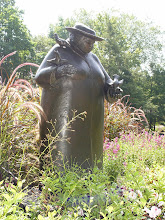Certainly, 2023 did not see me doing much blogging, and it was a year when a distressing number of projects did not advance much. Equally certainly, it was a difficult year: a wonderful young man who poured his heart and energy into the pollinator habitat project died suddenly in April, while the friend who started several solar projects in Marietta and was fading away from dementia died in June. Other friends dealt with cardiac problems, memory loss, falls, and other of the ills to which flesh is heir, and I myself had several health crises, all resolved but all reminders that the body fails with time. Nothing unusual or unexpected in human life, but never easy when it's your turn.
And of course, life went on despite our losses and struggles. The pollinator habitat did not get as much human attention as it has sometimes gotten, so particular plants became excessively enthusiastic and had eventually to be cut back or thinned to make room for less space-hungry neighbors. (Are you listening, Silphium perfoliatum?) What had been an open mulched space between the bottom of the slope and the shrub border filled in with partridge pea, evening primrose, cosmos, wingstem, violets, and what proved to be saw-toothed sunflower, a ten-foot yellow daisy with purple stems.
The site's fauna had no problems with the perhaps-excessive plant growth. While people in some parts of the county reported seeing few bees, they were all over our site all the time,
along with butterflies, moths, beetles, caterpillars, and quite an assortment of birds, including gaggles of goldfinches. After a hard frost left most of the site's vegetation looking less than its best, the little brown birds moved in to forage among the stems and on the ground.
And, thinking back, the human involvement did not stop. The city approved the planting of a memorial garden honoring our late volunteer and the couple who first gardened the site many years ago. Though work on that part of the site has only begun, neighbors and others, including children of the late couple, have donated plants. In April, Marietta's mayor joined a Girl Scout troop in planting an apple tree as one of the first additions to the memorial garden.
 |
| Mayor Josh Schlicher and Girl Scouts, photo by Nancy Taylor of the Marietta Times |
Other amenities for humans have been added. Thanks to a health department grant, the habitat has a one-of-a-kind bench designed by local artist Todd Morrow.
Along the riverbank below the habitat, the city has installed two more benches, giving the human users of the site multiple places to rest and enjoy river and habitat views. Across the river, behind Marietta's Armory Square, the solar charging bench that was part of the initial grant project was installed along the river trail and dedicated in November. Almost from day one, users of the trail have topped off their phone batteries while recharging themselves along the river.
Hmmm. It might be more accurate to say that this particular human did not get much done. Other things are moving along just fine.




.JPG)


